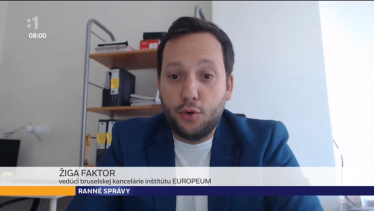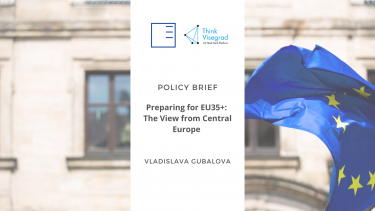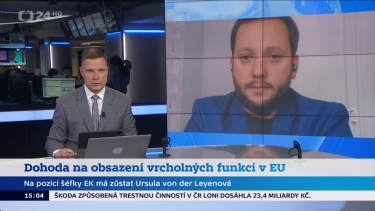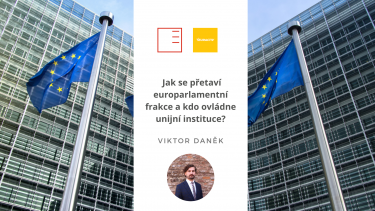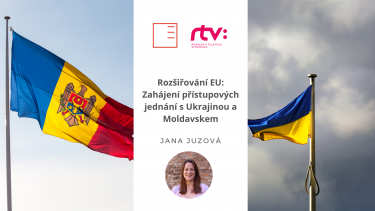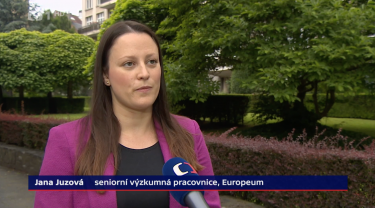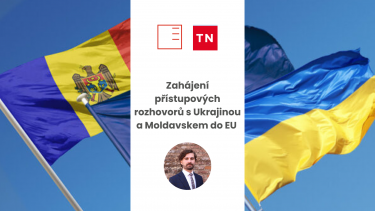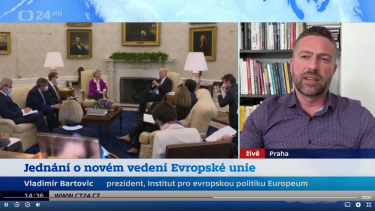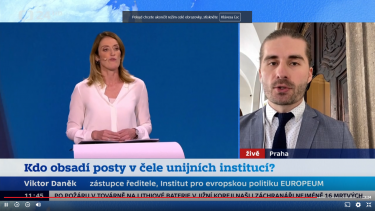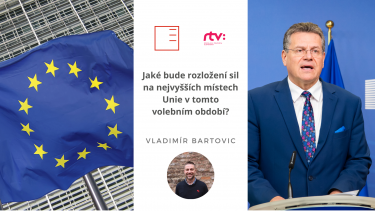STVR | The first plenary session of the European Parliament in its new composition
The first session of the European Parliament after the elections is beginning. MEPs will elect the presidents of the European Parliament and the European Commission. How does the plenary session proceed? And what will be crucial during it? Žiga Faktor, deputy director and head of the Brussels office at EUROPEUM Institute, responds for Slovak STVR.
Show more
Policy Brief | Preparing for EU35+: The View from Central Europe
Despite the historical support of EU enlargement policy by the Visegrad Four (V4), these Central European states are now faced with the challenge of reconciling their stances with the new realities of the process. As Ukraine and Moldova opened their accession negotiations, the EU seems to be torn on the questions associated with the future enlargement(s) - institutional reforms and changes within the EU budget. Transitioning from economic beneficiaries to potential contributors, the V4 states must evaluate the potential political and economic impacts of new members on both the EU and their domestic levels. Writes and proposes recommendations Vladislava Gubalova from GLOBSEC.
Show moreČT24 | Agreement on staffing of the top EU positions
Ursula von der Leyen is to continue as head of the European Commission and Kaja Kallas, the Estonian prime minister, will lead diplomacy. Both politicians have yet to be confirmed by MEPs. The leadership of the European Council, on the other hand, is already assured by former Portuguese Prime Minister António Costa. Žiga Faktor, deputy director and head of EUROPEUM Institute's Brussels office, offers his perspective.
Show more
Euractiv.cz | Post-election reshuffles. How will the European Parliament factions transform and who will dominate the EU institutions?
The key issues for the new term in the EU do not end with the European elections. Forces in European Parliament continue to shift depending on factions, while leaders select institutional leadership. How will the elections and the composition of the European Parliament influence the future functioning of the EU? And who will lead it? Viktor Daněk, Deputy Director of EUROPEUM Institute, answered these questions for Euractiv.cz.
Show moreRTVS | EU Enlargement: Initiation of Accession Negotiations with Ukraine and Moldova
The European Union has initiated accession negotiations with Ukraine and Moldova. What does this mean for its inhabitants? How do the accession talks proceed? And what must the countries fulfill? Jana Juzová, a senior researcher at EUROPEUM Institute, comments for Slovak RTVS Television.
Show moreUdálosti ČT | Accession talks between Ukraine and Moldova and the EU
The European Union has initiated accession talks with Ukraine and Moldova. This decision was preceded by two years of negotiations. The accession process is expected to take several years. Jana Juzová, a senior researcher at the EUROPEUM Institute, commented on the topic for Evening News on Czech Television.
Show moreTN.cz | Ukraine and Moldova begin EU membership talks
In Luxembourg, formal accession negotiations with Ukraine and Moldova to the European Union have begun. Is this a significant progress towards their eventual EU membership? Which of these two countries has a stronger position? And how does the screening process unfold? Viktor Daněk, Deputy Director of EUROPEUM Institute, discussed these topics for TN.cz.
Show moreČT24 | Negotiations on the new leadership of the European Union
Negotiations on the EU leadership positions will continue next week. On Thursday, leaders and presidents are due to make their final decision at a summit in Brussels. Vladimír Bartovic, President of EUROPEUM Institute, commented on whether Ursula von der Leyen will defend her post as President of the European Commission.
Show moreČT24 | Negotiations on the top EU positions
Two weeks after the publication of the European Parliament election results, it is unclear whether Ursula von der Leyen will remain at the head of the European Commission and the EPP party, which is expected to vote for her confirmation by the European Parliament, is weakening. The Renew Europe party has also weakened, losing its MEP's from Czech ANO movement. Viktor Daněk, deputy director of EUROPEUM Institute, commented for ČT24.
Show moreRTVS | What will be the balance of power at the top positions of the Union?
After the European Parliament elections, government leaders of the EU member states must agree on the leadership of the European institutions. The agreement must be finalized by the end of the month. Vladimír Bartovic, President of EUROPEUM Institute, answered questions about the negotiations.
Show moreStaroměstské náměstí 4/1
Prague 1 - Staré Město
110 00
tel.: +420 212 246 552
email: europeum@europeum.org
https://www.europeum.org
